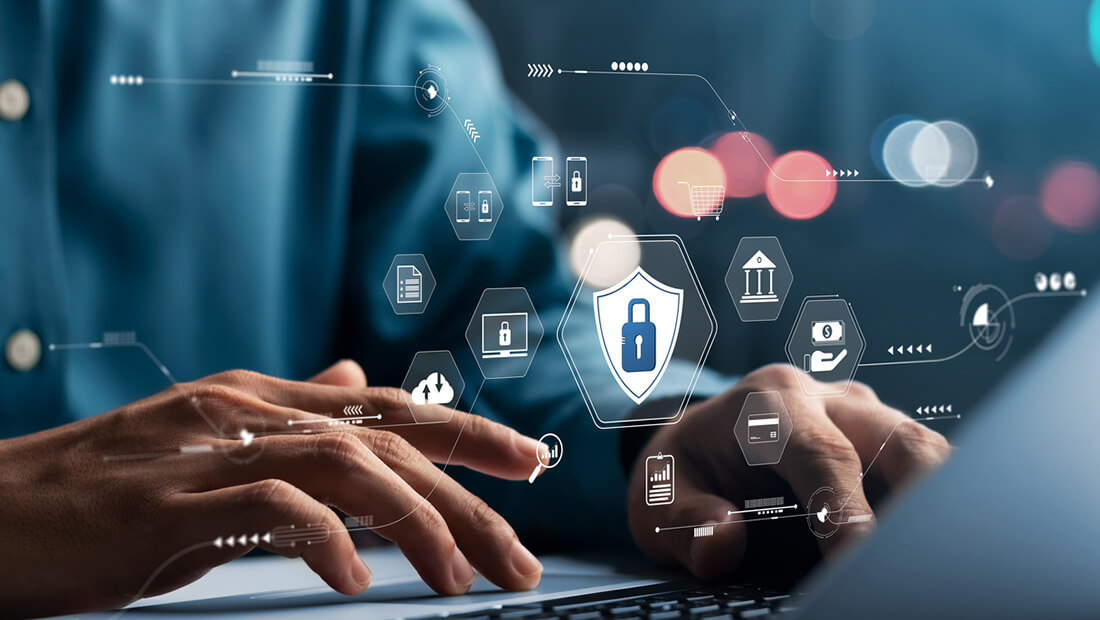In business, everything is connected.
That’s because it has to be.
Between flexible working structures—remote and hybrid teams—and the demands of a global workforce, your business needs to stay accessible to achieve its goals.
But every device that connects to your corporate network—desktops, laptops, mobile devices, and even IoT endpoints—represents both an opportunity and a potential vulnerability, especially when sensitive data and business continuity are at stake.
As cyber threats become more sophisticated, organizations can no longer rely on traditional antivirus software alone to safeguard sensitive information and maintain a secure environment.
Endpoint security has become a critical pillar of any comprehensive security strategy, helping security teams protect against advanced threats and data breaches across all endpoint devices.
But what is endpoint security, and why is it so important for modern businesses?
In this article, we’ll define endpoint security, review the importance of endpoint protection platforms and endpoint detection and response (EDR), and explain why a managed cybersecurity approach is essential for protecting your data, supporting regulatory compliance, and securing your business.
Key Takeaways
- Deploy advanced endpoint security solutions—including endpoint protection platforms (EPP) and endpoint detection and response (EDR)—to protect all devices and defend against both malware-based and malware-free cyber threats.
- Leverage continuous monitoring, behavioral analytics, and real-time threat intelligence to proactively detect and respond to sophisticated attacks before they can disrupt business operations or compromise sensitive data.
- Consider a managed endpoint detection and response (MEDR) service to access expert support, streamline security management, and free up internal IT resources for strategic business initiatives.
- Prioritize a layered, proactive security strategy that integrates endpoint security with other technologies—such as network security solutions and access controls—to ensure regulatory compliance, maintain business continuity, and safeguard your organization’s reputation.
What Is Endpoint Security?
Endpoint security is a comprehensive cybersecurity strategy focused on protecting all devices—known as endpoints—that connect to your corporate network.
These endpoints include desktops, laptops, mobile devices, servers, and increasingly, Internet of Things (IoT) devices. Each of these devices represents a potential entry point for cyber threats, making robust endpoint security essential for maintaining a secure environment and protecting sensitive data.
Unlike traditional antivirus software, which primarily targets known malware, modern endpoint security solutions provide multiple layers of protection.
These solutions—often called endpoint protection platforms (EPP)—combine advanced technologies such as antivirus, firewalls, intrusion detection and prevention systems (IDPS), data encryption, and application control into a unified platform.
This holistic approach enables security teams to monitor, detect, and respond to a wide range of cyber threats, from malware and ransomware to sophisticated attacks like advanced persistent threats (APTs) and zero-day exploits.
A comprehensive endpoint security strategy also includes continuous monitoring, threat detection, and rapid response to security incidents, helping organizations maintain data integrity, support regulatory compliance, and defend against data breaches and emerging threats.
Effective endpoint security ensures that every device—whether in the office or remote—operates within a secure environment, contributing to the overall resilience of your enterprise network.
Key Features of Modern Endpoint Security Solutions
Modern endpoint security solutions are designed to block unauthorized access attempts and mitigate risky activities at any point of entry to your business.
These systems typically include several cybersecurity platform components and advanced security technologies:
- Antivirus and Malware Protection: One of the most important aspects of endpoint security, these programs identify, quarantine, and remove malicious software.
- Firewalls: Firewalls act as a barrier between the internal network and external sources like the Internet. They control and manage network traffic based on security rules.
- Intrusion Detection and Intrusion Prevention Systems (IDS/IPS): IDS monitors network traffic and alerts on threats, while IPS can take action to block the threat.
- Endpoint Encryption: This refers to security measures that render data unusable unless the user has the proper decryption key. It's vital for protecting sensitive data.
- Endpoint Detection and Response (EDR): A more advanced component of endpoint protection, EDR solutions monitor endpoints for suspicious activity and respond to threats.
- Behavioral Monitoring and Machine Learning: Modern systems use machine learning to identify unusual patterns and advanced threats that may bypass traditional defenses. By analyzing user and device behavior, these solutions can detect and respond to zero-day attacks and other sophisticated cybersecurity threats.
- Centralized Management Console: This allows security professionals to oversee all endpoint devices from a single interface. It streamlines the deployment of security updates, enforces consistent security policies, and provides security teams with continuous visibility across the network.
Effective endpoint security solutions integrate seamlessly with other security technologies, such as network security solutions, access controls, and threat intelligence feeds. This approach enhances threat detection, supports data loss prevention, and enables a comprehensive security strategy across your organization.
Key Differences Between EPP, EDR, and Traditional Antivirus
Traditional antivirus software provides basic protection by scanning for known malware using signature-based detection. While this approach can stop common threats, it often falls short against today’s sophisticated cyberattacks.
Endpoint Protection Platforms (EPP) take security a step further by combining multiple layers—such as antivirus, firewalls, intrusion prevention, and data encryption—into a unified solution that proactively blocks both known and emerging threats. However, even the best preventive measures can be bypassed by advanced attacks.
That’s where Endpoint Detection and Response (EDR) comes in. EDR continuously monitors endpoint activity, detects suspicious behavior, and enables rapid investigation and remediation when threats slip through.
By integrating EPP and EDR, modern endpoint security solutions deliver advanced threat detection, continuous monitoring, and the ability to quickly respond to and contain security incidents.
How Does Endpoint Security Work?
Endpoint security works by establishing a multi-layered defense system that protects every device connected to your corporate network.
The process starts with deploying endpoint security software on each device, which then communicates with a centralized management console. This console allows security teams to enforce policies, monitor activity, and respond to incidents across the entire enterprise network.
Once in place, modern endpoint security solutions continuously monitor endpoint devices for signs of suspicious activity or unauthorized access attempts. Using advanced threat detection techniques—such as behavioral analysis, machine learning, and real-time threat intelligence—these systems can quickly identify and block potential threats, even those that traditional antivirus software might miss.
If a threat is detected, endpoint detection and response (EDR) tools automatically isolate affected devices, alert security professionals, and initiate investigation and remediation capabilities. This rapid response helps prevent data breaches, minimize business disruption, and maintain data integrity.
Additionally, endpoint security solutions integrate with other security technologies, such as network security solutions and access controls, to provide comprehensive visibility and robust protection across your organization.
Here’s the endpoint security process at a glance:
- Controls are in place to block known security threats.
- If a threat bypasses the preventive measures, the response phase activates.
- The response phase will eliminate or mitigate the threat.
- If needed, the system is patched of any vulnerabilities.
- Finally, predictive technology analyzes threat patterns to reduce the risk of future attacks.
For example, an IT administrator might use endpoint security tools to restrict access to specific sites that are home to malware or other malicious content.
Additionally, in the event of a cyberattack, like an employee downloading a malicious file from a phishing email, the endpoint security system will immediately identify the infected endpoint and subsequently quarantine the device from the rest of the network.
The Growing Need for Endpoint Security
Endpoint security is a mission-critical business effort. Nearly half of C-suite and other executives predict that cybersecurity threats targeting accounting and financial data will only increase in the coming years.
Cybercriminals are stealthy and are only getting harder to detect. Crowdstrike’s 2025 Global Threat Report found that 79% of detections last year were malware-free. The surge in malware-free attacks is a wake-up call—organizations must move beyond traditional antivirus and adopt advanced, layered endpoint security solutions that can detect, respond to, and contain threats that never drop malicious code.
But cyber attacks aren't just increasing in number; they're also becoming more severe. From ransomware attacks and data breaches to phishing scams and other cyber threats, as the digital landscape grows, attackers are using increasingly sophisticated tactics. This highlights the importance of employing robust endpoint security efforts.
In the past, an attacker may have targeted central servers or networks themselves. Now, though, with the widespread use of mobile devices and Internet of Things (IoT) solutions, it's these endpoints that represent the biggest risk for business operations.
This is because these endpoint devices often operate outside the traditional security parameters (i.e., in remote work environments). These devices usually lack stringent security requirements and become an open backdoor to a network.
Benefits of Endpoint Security
Endpoint security not only helps prevent security breaches, but also promotes operations efficiency.
Ransomware attacks alone can cause significant downtime, with downtime from such an attack averaging around 19 days.
A successful defense, including an endpoint security solution, can provide businesses protections against long disruptions, which often result in significant financial losses.
Of course, this is just one of the many benefits of endpoint security. Let's explore several more:
- Reduced Risk of Data Breaches: Endpoint security systems constantly monitor and protect endpoint devices, detecting and neutralizing threats before they penetrate a network.
- Regulatory Compliance: With increasing regulations around data security and privacy (e.g., GDPR, CCPA), it's of paramount importance that organizations use endpoint security to maintain compliance and protect customer and employee data.
- Maintain a Positive Business Reputation: Data breaches and cyberattacks can undermine customer trust. By prioritizing endpoint protection, an organization can display its commitment to protecting privacy and data.
- Proactive vs. Reactive Approaches: Instead of only reacting to threats as they occur, endpoint security systems offer a more proactive approach that identify and tackle threats before they can cause damage.
For organizations managing remote devices, supporting hybrid workforces, or operating in highly regulated industries, advanced endpoint security solutions are a critical component of a comprehensive security strategy.
Understanding Managed Endpoint Detection and Response
While it's obvious the impact endpoint security has on everyday business operations and cybersecurity awareness efforts, developing these systems in-house can put a significant strain on IT departments.
Fortunately, organizations can outsource these critical security functions by adopting a Managed Endpoint Detection and Response (MEDR) approach.
These cutting-edge security solutions go far beyond traditional firewalls and antivirus programs. A managed EDR service provides the people, processes, and next-generation endpoint protection technologies required to eliminate cyber threats across a company's endpoints.
With a MEDR solution, cybersecurity professionals handle the installation, configuration, management, and monitoring of a business's EDR systems. These fully managed solutions can free up time and resources from in-house IT departments so team members can focus on more important tasks.
Here are a handful of additional MEDR features:
- Remediation support
- Continuous 24/7, 365 monitoring
- Automatic alert systems
- Proactive cyber threat detection
- Next-generation behavioral analytics and reporting
By leveraging a robust MEDR solution, organizations—especially those with limited security staff or complex environments—can enhance their endpoint security posture, reduce risk, and maintain business continuity.
Are You Ready to Advance Your Endpoint Security Efforts?
Given the interconnected business ecosystem, protecting endpoint devices is a must.
With escalating threats of increasing severity and the widespread application of mobile devices and remote work, businesses just can't afford to overlook the need for robust endpoint security.
A proactive approach leveraging the power of managed EDR not only develops a business' resilience to potential threats, but also ensures overall compliance while preserving a company's reputation.
The strength of business cybersecurity is only as robust as the weakest endpoint. That's exactly why business leaders need to understand the importance of partnering with the right cybersecurity partner.
Doing so will ensure businesses have the right tools and technologies needed to secure future growth and protect customers, team members, and their bottom line.





